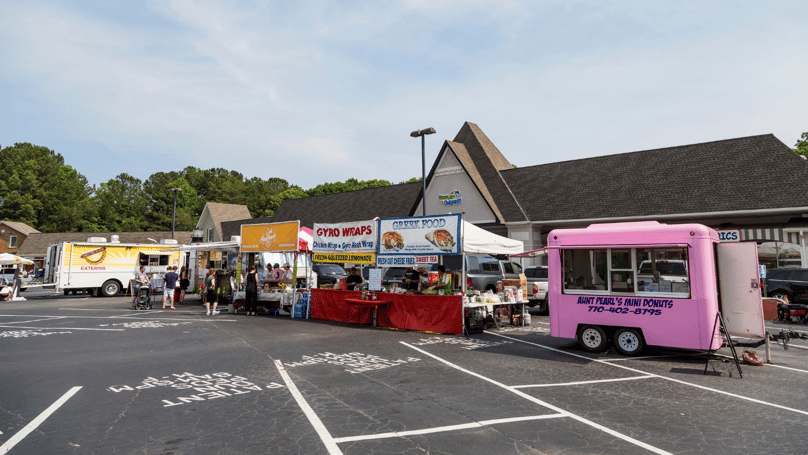How to Start a Food Truck Business Part 2: Permits & Legal Structure
We're back with part 2 of our starting a food truck series, and now we're really getting into the nitty-gritty. Here's a break down of which licenses and permits you'll need for your food truck, and how to choose the legal structure that's best for your new business.
Licences & Permits
When starting a food truck, you'll need to obtain several licenses and permits to comply with local regulations. The specific requirements will vary depending on your location, so it's essential to research and consult with local authorities. Here are some common licenses and permits you may need:
Business License
You’ll need a general business license to operate legally in your area. Check with your local government or small business administration for the specific requirements.
Food Handler's License
Many jurisdictions require food handlers, including food truck operators, to obtain a food handler's license. This ensures you and your staff understand proper food handling and safety practices.
Health Department Permits
Food trucks typically require health department permits to ensure compliance with food safety regulations. This may involve inspections of your truck's kitchen, equipment, and storage areas.
Mobile Food Vendor Permit
In some areas, a mobile food vendor permit is necessary. This covers aspects such as location restrictions, parking regulations, and adherence to health and safety guidelines.
Parking Permits
Depending on local regulations, you may need permits for parking your food truck in certain areas, such as city streets or designated food truck zones. Check with your local transportation department or parking authority to understand the requirements.
Fire Department Certifications
Fire safety regulations are crucial for food trucks. You may need to obtain certifications or permits from the fire department to ensure your truck meets fire safety standards.
Seller's Permit/Tax ID
If you plan to sell taxable goods, you'll likely need a seller's permit or tax identification number. This permit allows you to collect and remit sales tax to the appropriate tax authorities.
Alcohol License
If you want to serve alcohol from your food truck, you'll need an alcohol license or permit.
Remember, the requirements can vary significantly by location. Make sure to reach out to your local government offices, health departments, and licensing agencies to get accurate and up-to-date information on the specific licenses and permits you need for your food truck operation.
Legal Structure
Deciding on the legal structure for your food truck business is an important step that will determine how you operate, your liability, and how you're taxed. Here are some common legal structures to consider and some factors that'll help you make a decision:
Sole Proprietorship
This is the simplest and most common legal structure for small businesses. As a sole proprietor, you have complete control over your food truck and its operations. However, you are personally liable for any debts or legal issues that may arise. Tax-wise, your business income is reported on your personal tax return.
Partnership
If you plan to run the food truck business with one or more partners, a partnership structure may be suitable. Partnerships can be general partnerships or limited partnerships, and each partner contributes to the business and shares in profits, losses, and liabilities. A partnership agreement should be drafted to outline each partner's roles, responsibilities, and profit distribution.
Limited Liability Company (LLC)
An LLC offers a level of personal liability protection for the owners (known as members) while maintaining flexibility in management and taxation. It separates personal and business assets and limits the owners' personal liability. LLCs can be a good choice for food truck businesses with multiple owners or those seeking liability protection.
Corporation
A corporation is a separate legal entity from its owners (known as shareholders). It offers the highest level of liability protection, but it involves more complex legal and financial requirements. There are two types of corporations: C corporations and S corporations. C corporations are subject to corporate taxation, while S corporations have pass-through taxation, similar to an LLC. Corporations are typically more suitable for larger-scale food truck businesses with multiple owners or those planning to seek external investors.
Here's what to think about when deciding on the legal structure:
Liability Protection: Evaluate the level of personal liability protection you need. If you want to protect your personal assets from business liabilities, consider an LLC or corporation.
Taxes: Understand the tax implications of each legal structure. Chat with a tax professional to determine the best structure for your specific financial situation.
Management and Control: Consider how you want to manage and control your food truck business. Some legal structures offer more flexibility and autonomy than others.
Complexity and Costs: Check out the legal and administrative requirements, like filing fees, ongoing compliance, and record-keeping obligations associated with each legal structure. Consider the complexity you're comfortable with and the associated costs.
Future Plans: Think about your long-term goals for your food truck business. If you plan to expand, seek investors, or eventually go public, a corporation might be the best choice.
Pro Tip: Talking with a business attorney or a qualified professional experienced in small business legal matters can give you valuable guidance in determining the best legal structure for your food truck business. They can help you understand the specific legal and tax implications based on your location and circumstances.
Dig Deeper: Find out where to purchase your food truck in part 3.



.png)